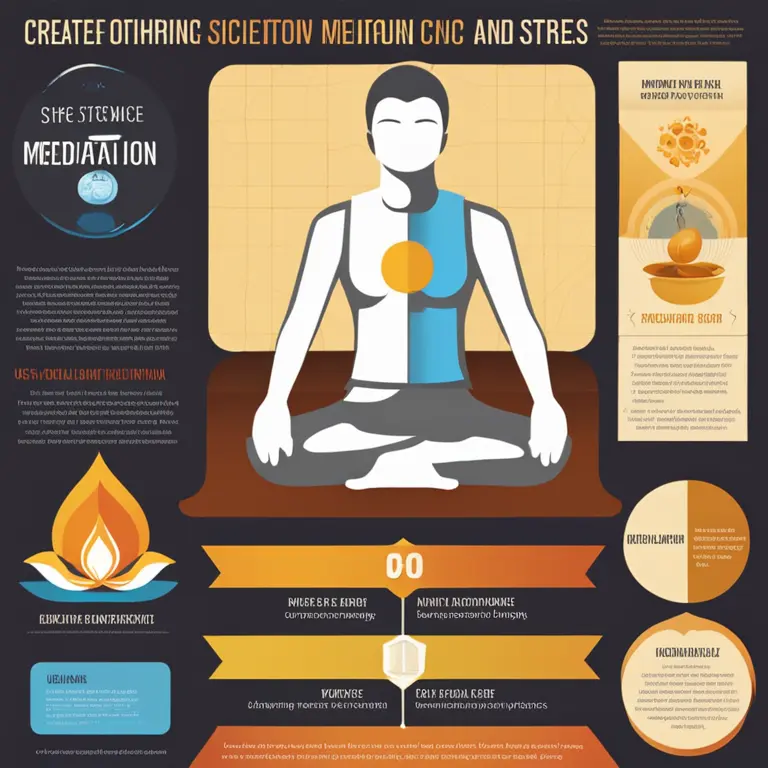
Meditation: A Calm Approach to Stress Relief
Discover how integrating meditation into your daily routine can provide a powerful tool for managing stress, fostering mental clarity, and restoring inner peace.
article by Hina Kurosawa
Meditation: Ancient Practice, Modern Benefits
Meditation has traversed through centuries, offering tranquility and insight to those who practice it. Its relevance endures, particularly in today's fast-paced society where chronic stress is prevalent. Stress, while a natural response to life's challenges, can lead to long-term health issues when not managed effectively. Meditation not only helps alleviate stress but also improves overall wellbeing. Various studies in the field of psychoneuroimmunology substantiate meditation’s potential to reduce the production of stress hormones such as cortisol and adrenaline, fostering a state of relaxation.

The Science of Meditation and Stress
Neuroscientific research has illuminated meditation's impact on the brain, showing significant changes in brain regions associated with attention, emotion regulation, and self-awareness. These neural adjustments correspond with a decrease in anxiety and stress. Furthermore, meditation enhances the brain's neuroplasticity, allowing for greater resilience to stressors. Regular meditators often report higher levels of emotional stability and an improved capacity to handle stressful situations with composure.

Types of Meditation for Stress Management
There are various styles of meditation suitable for stress relief. Mindfulness meditation encourages focused attention on the present moment, reducing rumination and worry. Transcendental Meditation, which involves the repetition of a mantra, has been shown to lower stress and anxiety levels. Other forms include guided imagery, where one visualizes calming scenes, and loving-kindness meditation, which fosters a sense of compassion and connectedness, easing social stress.

Integrating Meditation Into Your Routine
Regular practice is key to gaining the anti-stress benefits of meditation. Even short sessions can contribute to stress relief. Starting with a few minutes each day and gradually increasing the duration can make meditation more manageable and enjoyable. It's beneficial to create a serene space dedicated to the practice. Moreover, incorporating mindfulness techniques during routine activities can cultivate a meditative mindset throughout the day.

Barriers to Meditation and How to Overcome Them
Many individuals feel too stressed to begin meditating, but starting small can assuage this hesitation. Simple breathing exercises can be a gateway to deeper meditation practice. Others may doubt their ability to meditate properly. However, the essence of meditation is simplicity – there’s no need for perfection in the practice. Additionally, countless mobile apps and online resources provide guided instructions suitable for beginners, helping to surmount initial obstacles.
Meditation as a Holistic Approach to Wellbeing
Meditation's benefits extend beyond stress relief. It contributes to better sleep, reduces chronic pain, and can even enhance immune function. By fostering a holistic sense of health, meditation serves as a foundation for a more balanced lifestyle. Its adaptability means that it can complement various other elements of a holistic approach, such as balanced nutrition, regular exercise, and sufficient sleep.
Published: 1/14/2024
Modified: 1/15/2024
More predictions
Come back here soon to learn more about yourself and your future


Calming the Storm: Mindfulness Meditation for Anger
Discover how mindfulness meditation can be a powerful tool for anger management, promoting inner peace and emotional balance.


Easing Loneliness with Meditation
Discover how mindfulness meditation can provide solace and connection to mitigate feelings of loneliness, enhancing emotional and mental well-being.


Harmonizing Life with Meditation Mantras
Delve into the transformative power of meditation mantras to align mind, body, and spirit for a harmonious existence.